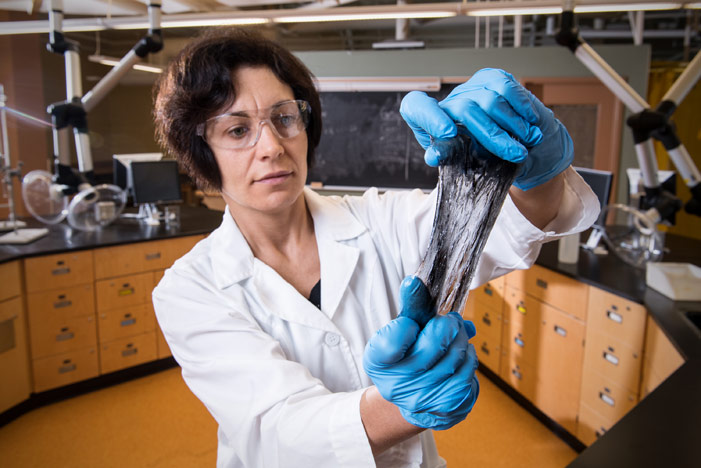UNB scientist lands federal funding for flexible laminate to power gadgets
Author: Communications
Posted on Aug 16, 2017
Category: UNB Fredericton
 A University of New Brunswick researcher is receiving federal funding that will help further develop a stretchable, flexible laminate that can provide power to a wide range of electronic devices.
Dr. Anna Ignaszak, an associate professor of chemistry at UNB, has been working for three years to develop the rechargeable coating designed to deliver long-lasting power in small devices such as smartwatches and to offset demands that gadgets make on planes and cars.
“For instance, on an aircraft where there are screens for each passenger, the back of each screen could be coated with this laminate, providing power while lowering the overall load on the aircraft’s power system,” she says.
Her research is one of more than 220 projects across the country to receive funding from the Canada Foundation for Innovation.
Minister of Science Kirsty Duncan announced the investment today of more than $52 million in infrastructure projects at 51 universities across Canada through the John R. Evans Leaders Fund, allowing universities and researchers to carry out ground-breaking research in world-class facilities.
“We’re very pleased to see this pioneering research recognized at the national level,” said Acting UNB Vice-President (Research) Dr. David MaGee. “It is innovation like this that propels the University of New Brunswick’s reputation as a leader in research and discovery not only in this province but across the nation.”
Funding of $150,000 will allow Dr. Ignaszak to purchase specialized equipment for her lab at UNB, further propelling development of the laminate.
“Our scientists need the best tools and equipment for ground-breaking research and discovery and we are committed to ensuring they have them,” said Dr. Duncan. “Their successes will lead to an improved economy and will fuel an active research community here in Canada and internationally.”
The laminate, now undergoing testing, is different from other flexible materials designed to deliver power in that it is stretchable, Dr. Ignaszak said.
“It can be crafted to different sizes and shapes to adjust to the device easily,” she said. “The thicker it is, the more energy it can store.”
She is drawn to research on power systems as part of the global drive for zero-emission technologies.
Her innovation, for instance, could allow devices in electric or hybrid cars to run without drawing from the vehicle batteries, improving the performance of the vehicle.
“This is part of the global, clean energy idea,” Dr. Ignaszak said.
Media contacts
A University of New Brunswick researcher is receiving federal funding that will help further develop a stretchable, flexible laminate that can provide power to a wide range of electronic devices.
Dr. Anna Ignaszak, an associate professor of chemistry at UNB, has been working for three years to develop the rechargeable coating designed to deliver long-lasting power in small devices such as smartwatches and to offset demands that gadgets make on planes and cars.
“For instance, on an aircraft where there are screens for each passenger, the back of each screen could be coated with this laminate, providing power while lowering the overall load on the aircraft’s power system,” she says.
Her research is one of more than 220 projects across the country to receive funding from the Canada Foundation for Innovation.
Minister of Science Kirsty Duncan announced the investment today of more than $52 million in infrastructure projects at 51 universities across Canada through the John R. Evans Leaders Fund, allowing universities and researchers to carry out ground-breaking research in world-class facilities.
“We’re very pleased to see this pioneering research recognized at the national level,” said Acting UNB Vice-President (Research) Dr. David MaGee. “It is innovation like this that propels the University of New Brunswick’s reputation as a leader in research and discovery not only in this province but across the nation.”
Funding of $150,000 will allow Dr. Ignaszak to purchase specialized equipment for her lab at UNB, further propelling development of the laminate.
“Our scientists need the best tools and equipment for ground-breaking research and discovery and we are committed to ensuring they have them,” said Dr. Duncan. “Their successes will lead to an improved economy and will fuel an active research community here in Canada and internationally.”
The laminate, now undergoing testing, is different from other flexible materials designed to deliver power in that it is stretchable, Dr. Ignaszak said.
“It can be crafted to different sizes and shapes to adjust to the device easily,” she said. “The thicker it is, the more energy it can store.”
She is drawn to research on power systems as part of the global drive for zero-emission technologies.
Her innovation, for instance, could allow devices in electric or hybrid cars to run without drawing from the vehicle batteries, improving the performance of the vehicle.
“This is part of the global, clean energy idea,” Dr. Ignaszak said.
Media contacts
- Kelly Stewart: Communications Assistant, University of New Brunswick, (506) 470-3413, kelly.stewart@unb.ca
- Malorie Bertrand: Media Relations and Social Media Specialist, Canada Foundation for Innovation, (613) 943-2580, (613) 447-1723, malorie.bertrand@innovation.ca
- Ann Marie Paquet: Press Secretary, Office of the Minister of Science, (343) 291-2692, ann-marie.paquet@canada.ca
- Media Relations: Innovation, Science, and Economic Development Canada, (343) 291-1777, ic.mediarelations-mediasrelations.ic@canada.ca
